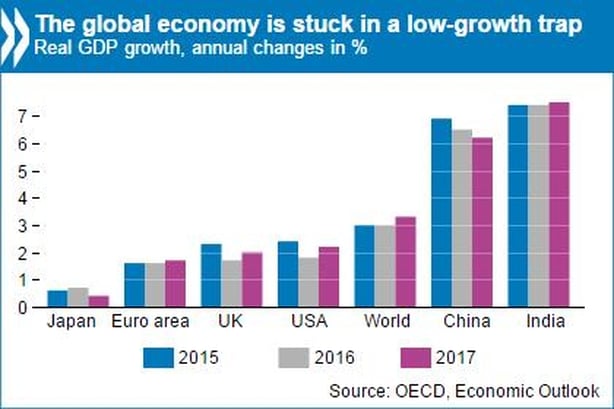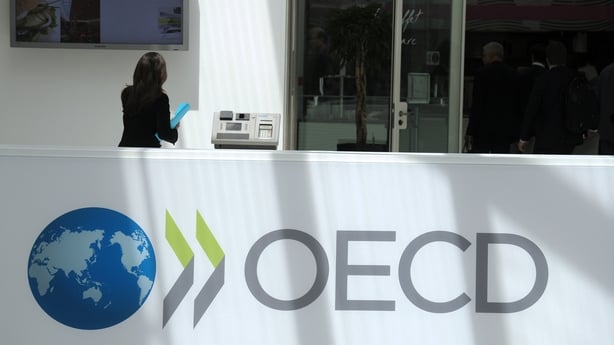The OECD has said that the Irish economy will grow strongly this year and next, pushing unemployment down further and leading to increased consumer spending.
In its biannual Economic Outlook, the OECD said that a tighter labour market will drive wages higher.
It also warned that wage growth may turn out to be stronger than projected, lifting consumer spending in the short run but pushing up inflation and eroding competitiveness over the medium term.
The report said that the Government may be tempted to spend more of the fruits of a growing economy.
But "given the vigorous expansion, the Government should avoid more fiscal stimulus than currently planned" so as to avoid the risk of overheating the economy, it added.
It noted that business investment - even when excluding the multinationals - has grown solidly.

But it cautioned that lending rates to SMEs are "among the highest in the Euro area", while tight credit conditions will continue to exert a drag on investment.
The OECD said that productivity growth in Ireland has been trending down for some time because of a slowdown in Knowledge Based Capital (KBC) investment.
A recent surge in KBC investment by multinational companies should, it said, lift productivity growth - although much of this surge may be related to the "onshoring" of intellectual property already used by these multinationals.
The organisation said the diffusion of innovation to smaller, Irish owned firms is likely to be limited by the weak linkages with the multinationals.
It has urged the Government to offer more direct research and development support to domestic SMES, rather than R&D tax credits, as is currently the case, which are more advantageous to multinationals.

Last year gross fixed capital formation grew by 28%, but this year the OECD said it is expecting growth of 10%, dropping to 4.3% next year.
Consumer spending should grow in line with labour earnings, although the OECD noted that debt repayment will likely keep its momentum in check.
It is projecting private consumption growth of 3% this year and next, down slightly form 3.5% last year.
Debt is also a factor in its assessment of the Government's budget stance.
It said the Government is on track towards its medium term goal of a balanced budget, but said most of the projected improvement in the deficit is due to the upswing in the economic cycle, rather than from specific budget actions.
Strong revenue growth and low interest costs should be used for a more rapid reduction of the "still high public debt", it added.
It also advised the Government to prioritise structural reforms that would get more people back to work by improving the efficiency of public employment services, so that growth can become more sustainable.
It said the unemployment rate fell to 9% last year, but noted that Ireland's employment rate remains low.
This year the OECD said it expects GDP to grow by 5% while total domestic demand is forecast to grow at 4.8% - half of last year's rate.
It had pencilled in export growth of 6% and import growth of 6.9% - both well down on last year's very strong figures of 14% and 16% respectively.
HICP inflation - at zero last year - is forecast at 0.3% this year and 2.2% in 2017, the Paris-based organisation said.

